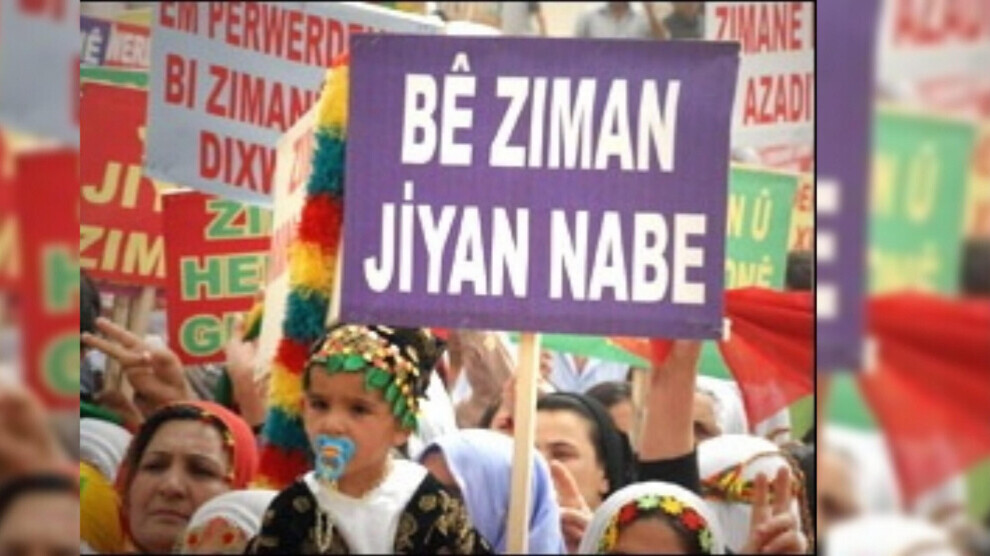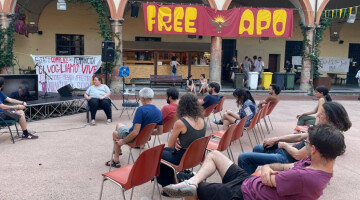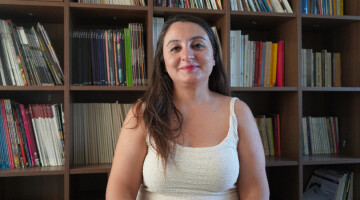The Education Committee of the Kurdistan Communities Union (KCK) released a statement to mark February 21, International Mother Language Day.
The KCK underlined that since the Kurdish language suffers oppression, the Kurds are faced with exploitation, assimilation and genocide. “For a people, language is identity, freedom of thought, existence. Let's protect our identity, freedom and existence. Language is the body, let's take care of our body,” the KCK said.
The statement published by the KCK Education Committee on Monday is as follows:
“Let us not forget that a language dies not because its speakers are few, but because those who know it do not speak, embrace and fight for it”, the statement said.
“On the occasion of the 23rd International Mother Language Day, we congratulate especially Abdullah Öcalan who carries out a struggle for the freedom of a people whose culture, identity, language and existence has been banned and ignored, our martyrs who do not see death as an end to the existence, language, values and freedom of their people and who became immortal. We also congratulate our resilient people and other peoples who sing, tell stories of heroism and lament in their own language, and do not bow down to bans, oppression, intimidation, torture and deaths.
Language, one of the most important aspects of humanization and socialization, is the key element and communication tool in the creation and development of cultures. In this sense, every language is a cornerstone of society.
A SOCIETY THAT LOST ITS LANGUAGE ALSO LOSES ITS EXISTENCE
Language is not only the main element of the formation of a social mentality, but also the key element of social construction. A people is a people only if it can protect its language, and it can protect and develop its sociability only through an engagement with it. In this regard, language is the main element of a collective mind. The development of society is in line with the development of language. However, it is also true that a society that has lost its language is a society that has lost its existence. Because language, like culture, is the memory of societies; it is the manifestation of the mentality, thought, emotion and moral values of society. The more a society develops its mother tongue, the more it improves its living standards. A society whose language has been banned under the exploitation and domination of other languages is faced with exploitation, assimilation and genocide.
ONE LOSES HIS MEMORY IF ONE FORGETS HIS LANGUAGE
The official state policies introduced following the development of the capitalist system continue to threaten the existence of languages. Due to the monist nation-state policies in many parts of the world since the beginning of the 20th century, many countries have become the graveyards of languages. Nation-states hostile to democracy have made monolingual education compulsory in all areas of life. The only way to assimilate a society is to put a ban on its language. Undoubtedly, the greatest damage is done to a society when it cannot speak its own language, forgets and gradually moves away from it. It is inevitable that if a society forgets its language, it also forgets its culture, history, identity and ultimately its collective memory. This is a cultural genocide that is carried out systematically by the nation-states.
While the language revolution led by Kurdish women in the lands of Kurdistan tens of thousands of years ago marked a new epoch in the development of humanity, today in the same land the Kurdish people leading the revolution have been banned from using their language while engaging in politics, laughing, crying and even whistling, as Kurdish author Apê Musa once said.
UNESCO'S SILENCE SUPPORTS LANGUAGE GENOCIDE
Although banning the use of mother tongue, which is the most basic universal right, is defined as a cultural genocide by the United Nations and European conventions, Turkish, Persian and Arab nation-states have put pressure on the Kurdish language and culture and deprived our people of all opportunities of education in mother tongue. The Kurdish language and culture, including its literature, history and music, have been disrespected and face extinction within the dominant state language and culture. The silence of the UNESCO towards these inhuman, fascist practices against our language and culture carried out by nation-states supports this linguistic and cultural genocide.
At a time when we are celebrating International Language Day, our people are imprisoned for giving education in Kurdish, they are killed for singing Kurdish songs, our language and cultural institutions are closed, prisoners are prevented from defending themselves in their mother tongue and summaries of proceedings are prepared for dancing to Kurdish songs.
OUR PEOPLE WILL NOT BE TRICKED BY ELECTIVE COURSES
This immoral, fascist mentality pretends to be doing a favour by introducing elective courses in Kurdish in secondary schools. The fascist Turkish state wants to show how democratic it is and says to our people that “you should be content with I give you”. The fascist Turkish state should know this very well; our people will take a very conscious stance in the face of the Turkish state's policy to eliminate the struggle for the Kurdish language and making the Kurdish people be content with less. It should be known that education in the mother tongue is not a favour but a civil right at every educational level. An elective course is provided with a second language other than your mother tongue. Education in the mother tongue, which is a universal right, cannot be an elective course.
What needs to be done under these unequal conditions is to carry out the struggle for our own language, existence and identity stronger than ever in all public and legal fields. The education model of North-East Syria is a significant example of self-power and self-will for all peoples who are struggling for existence, identity and language in the region and in the world. It shows that we, as peoples, can live multilingually, multiculturally and equally with our differences beyond the life imposed on us for centuries, and another life based on equality, freedom, democracy, human rights, and children's rights is possible.
A LANGUAGE DIES IF NOBODY FIGHTS FOR IT
As the KCK Education Committee, we would like to state once again that education in mother tongue is a universal right. On this basis, the demand for education in mother tongue is more legitimate than any other demand. Let us not forget that a language dies not because its speakers are few, but because those who know it do not speak, embrace and fight for it. Our people, both at home and abroad, should consider speaking and writing in Kurdish as the most fundamental act of protecting their mother tongue. They should vigorously fight to secure education in mother tongue wherever they are, to remove the obstacles to the use of mother tongue in the public sphere and assimilationist policies that impose linguistic homogenisation. On this occasion, we once again celebrate the International Mother Tongue Day of our people and all peoples fighting for their mother tongues.”















